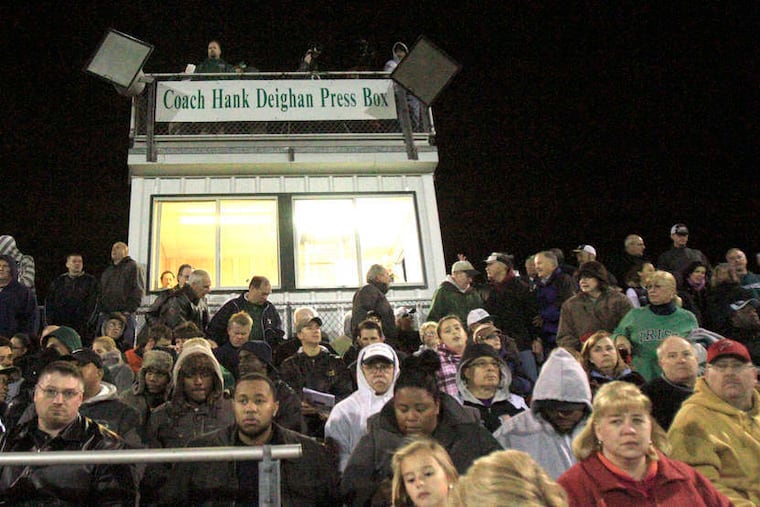Phil Anastasia: Catholic schools playing the funding game
Friday night at Camden Catholic was about football. It was a game. It was a high school sporting event. It was a showcase for top athletes and dedicated coaches, a showdown of unbeaten teams with the highest of postseason aspirations.

Friday night at Camden Catholic was about football.
It was a game. It was a high school sporting event. It was a showcase for top athletes and dedicated coaches, a showdown of unbeaten teams with the highest of postseason aspirations.
It was something else, too.
It was a big crowd. It was an excited student body. It was an engaged alumni.
It was lifeblood for a private school that needs every drop.
Camden Catholic is no different from Paul VI or Gloucester Catholic or St. Joseph of Hammonton or Holy Cross or Holy Spirit.
And these schools aren't drastically different from Bishop Eustace Prep and St. Augustine Prep.
They need good sports teams. They need visibility. They need school spirit. They need old graduates to come back - and to bring their checkbooks.
These schools have been attracting and developing top players for years. They've been winning games and creating excitement for years.
But it's different now. It's not just about hanging banners and filling the trophy case.
It's about survival.
Look around. Look at the state of the economy and the state of private education - people out of work, declining enrollments in high schools, shuttered Catholic grammar schools across South Jersey.
What happens in three years, when high schools start truly feeling the impact of the loss of those feeder schools? In five years?
"I've never seen it this tough," said St. Augustine coach Paul Rodio, the school's director of development. "I've never seen it this competitive out there."
It's crazy competitive among private schools these days. There's a rapidly shrinking pool of prospective students - thanks to the economy and sky-high property taxes and the church's self-inflicted wounds - and there's an air of near-desperation as enrollments decline and the Diocese of Camden down-throttles on its commitment to subsidize education.
These schools need to attract students, so they stress their academic standards and their faith-based curriculums and their computer labs and science clubs and service organizations.
Also, their football teams.
Plus their basketball, baseball, softball, and lacrosse teams.
Just look at the investment in facilities. Camden Catholic, Bishop Eustace, Paul VI, and St. Augustine installed new artificial-turf surfaces in their football stadiums in the last five years.
St. Augustine built a gymnasium and pool. Paul VI is building a baseball field. Gloucester Catholic is about to break ground on an athletic campus in Deptford - a three-phase, 11-field project that likely will cost $4 million to $5 million and culminate with construction of a state-of-the-art football stadium.
This situation has wide-ranging implications. It's one thing to want to be good. It's quite another to need to be good.
Every school wants to be good in every sport. But when you need to be good, it raises the stakes in terms of competition with other private schools as well as public schools to "attract" top athletes.
That turns up the heat on everybody, especially in football.
Football drives the bus. As much as private schools need to be broad-based in their athletic offerings - as much as they like to offer ice hockey and tout their lacrosse teams - nothing compares with those Friday Night Lights.
It's a vibrant football program that best generates school spirit, engages the alumni - especially those deep-pocketed graduates - and raises the profile of the institution.
Sure, demanding academics are a big draw, especially for those big-ticket prep schools that send so many students to top colleges. Sure, other extracurricular activities - from the science clubs to the musical offerings to service programs - attract students and create the basis for a well-rounded education.
But sports is a huge part of this equation.
Nobody in private education is going to stand up and say, "We're all about winning, especially in football."
But it's tough to fulfill the mission without maintaining enrollment, and it's tough to maintain enrollment without stirring school spirit and engaging the alumni and raising the profile of the institution.
Translation: touchdowns.